IN-DEPTH / IN-DEPTH
Xinjiang scores victories in the war on poverty
In the rural areas of Northwest China's Xinjiang Uyghur Autonomous Region, many used to suffer from the scourge of poverty. They lacked education, jobs, and access to technology to finance.
According to the poverty alleviation plan for the 13th Five-Year Plan period (2016-20), China is set to lift all out of poverty by 2020.
In the past year, the poverty reduction has been paired with favorable policies. Government departments and companies in Xinjiang and in other areas have set up working stations in villages, working hard to develop rural areas. The added bonus of the region's social stability is also becoming more apparent. Villagers in Xinjiang have gradually shaken off poverty.
Recently, the Global Times reporters visited some of the rural residents in Southern Xinjiang to see the changes in their life.
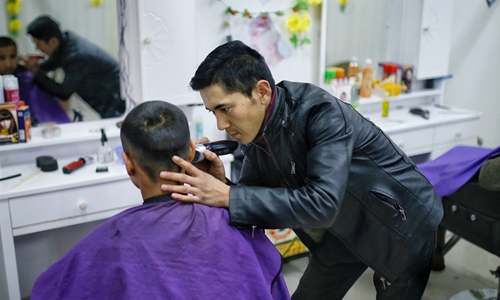
Yuermeiti Saimaiti, a barber, cuts hair for a villager. He is from the Tuowankemaigaiti village in Wushi county, Aksu of Xinjiang Uyghur Autonomous Region. Under the help of members from Xinjiang's organization department of the Party committee stationed in the village, Yuermeiti opened a barbershop in the village bazaar. He also does facials. (Photo: Shan Jie/GT)
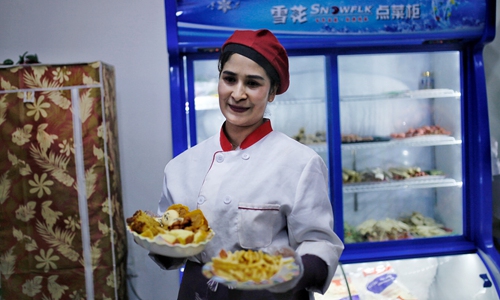
Ajiranmu Ahmet shows the cakes and French fries she made. She opened a restaurant in the bazaar at the Tuowankemaigaiti village in Wushi county, Aksu of Xinjiang Uyghur Autonomous Region. The cakes she made are quite popular among villagers. (Photo: Shan Jie/GT)
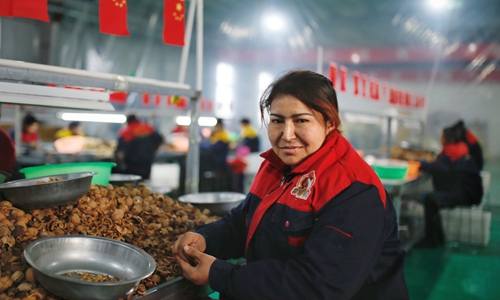
Rebiyem Mehmet poses in a walnut factory where she works in Wushi county, Xinjiang Uyghur Autonomous Region. She did not have a job before and is grateful to work in the factory. Now she earns 1,800 yuan a month and can envision a good future for her children. (Photo: Shan Jie/GT)
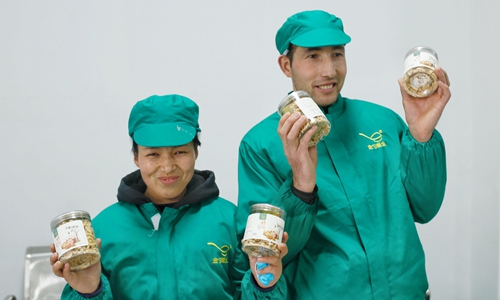
Maryam Abuli and Palhaman Islam show the honey walnut they produced in a nut company in Wushi county, Xinjiang Uyghur Autonomous Region. They have worked here for six months and together can earn 4,000 yuan a month. They shook off poverty this year and plan to buy a car next year. (Photo: Shan Jie/GT)
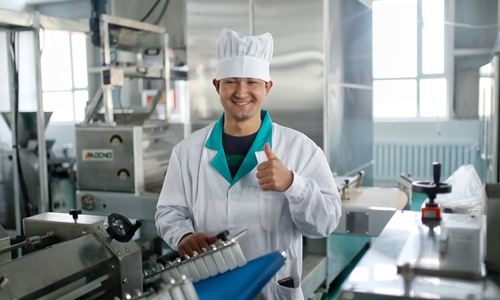
Mehmet Tulti Abudureyimu stands in front of an automatic production line of nangs, a traditional pancake, in a village cooperative in Keping county, Xinjiang Uyghur Autonomous Region. In spite of his youth he has become the master of the production line. (Photo: Shan Jie/GT)
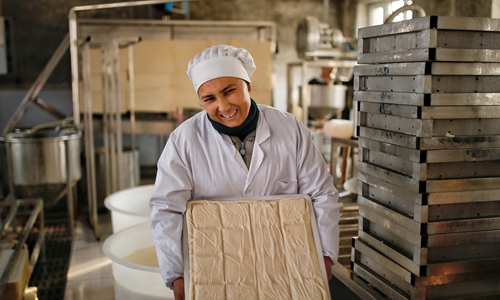
Ayinishahan Abulimiti shows fresh tofu she just made. A Kalakuti villager in Keping county, Xinjiang Uyghur Autonomous Region, Ayinishahan now earns double than before thanks to the tofu factory built with the help of Sinopec Northwest Company in the village. She loves tofu dishes. (Photo: Shan Jie/GT)
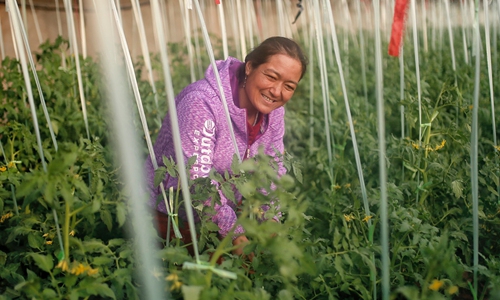
Hunqiemu Wubulikasimu checks the tomato plants in a greenhouse in Kalakuti village, Keping county, Xinjiang Uyghur Autonomous Region. Her family took charge of the greenhouse this year. Employees from the Sinopec Northwest Company who came to the village taught her how to use the best harvesting technology, which has boosted her confidence. (Photo: Shan Jie/GT)
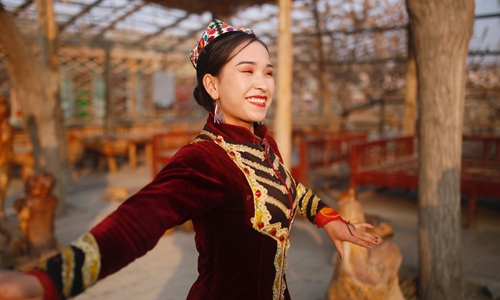
Ayijiamali Kurban dances in a restaurant at a scenic spot in Awati county, Aksu in Xinjiang Uyghur Autonomous Region. Her family used to be stricken by poverty, but now she earns 3,000 yuan a month. (Photo: Shan Jie/GT)
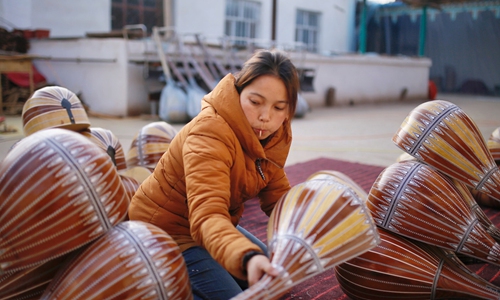
Xiazeerdan Abuduoremu puts strings on dutar instruments. She has been working in the instrument cooperative in Jiayi village, Xinhe county, in Xinjiang Uyghur Autonomous Region for a year and a half. The traditional Xinjiang instruments she makes are sold throughout China. (Photo: Shan Jie/GT)
According to the poverty alleviation plan for the 13th Five-Year Plan period (2016-20), China is set to lift all out of poverty by 2020.
In the past year, the poverty reduction has been paired with favorable policies. Government departments and companies in Xinjiang and in other areas have set up working stations in villages, working hard to develop rural areas. The added bonus of the region's social stability is also becoming more apparent. Villagers in Xinjiang have gradually shaken off poverty.
Recently, the Global Times reporters visited some of the rural residents in Southern Xinjiang to see the changes in their life.

Yuermeiti Saimaiti, a barber, cuts hair for a villager. He is from the Tuowankemaigaiti village in Wushi county, Aksu of Xinjiang Uyghur Autonomous Region. Under the help of members from Xinjiang's organization department of the Party committee stationed in the village, Yuermeiti opened a barbershop in the village bazaar. He also does facials. (Photo: Shan Jie/GT)

Ajiranmu Ahmet shows the cakes and French fries she made. She opened a restaurant in the bazaar at the Tuowankemaigaiti village in Wushi county, Aksu of Xinjiang Uyghur Autonomous Region. The cakes she made are quite popular among villagers. (Photo: Shan Jie/GT)

Rebiyem Mehmet poses in a walnut factory where she works in Wushi county, Xinjiang Uyghur Autonomous Region. She did not have a job before and is grateful to work in the factory. Now she earns 1,800 yuan a month and can envision a good future for her children. (Photo: Shan Jie/GT)

Maryam Abuli and Palhaman Islam show the honey walnut they produced in a nut company in Wushi county, Xinjiang Uyghur Autonomous Region. They have worked here for six months and together can earn 4,000 yuan a month. They shook off poverty this year and plan to buy a car next year. (Photo: Shan Jie/GT)

Mehmet Tulti Abudureyimu stands in front of an automatic production line of nangs, a traditional pancake, in a village cooperative in Keping county, Xinjiang Uyghur Autonomous Region. In spite of his youth he has become the master of the production line. (Photo: Shan Jie/GT)

Ayinishahan Abulimiti shows fresh tofu she just made. A Kalakuti villager in Keping county, Xinjiang Uyghur Autonomous Region, Ayinishahan now earns double than before thanks to the tofu factory built with the help of Sinopec Northwest Company in the village. She loves tofu dishes. (Photo: Shan Jie/GT)

Hunqiemu Wubulikasimu checks the tomato plants in a greenhouse in Kalakuti village, Keping county, Xinjiang Uyghur Autonomous Region. Her family took charge of the greenhouse this year. Employees from the Sinopec Northwest Company who came to the village taught her how to use the best harvesting technology, which has boosted her confidence. (Photo: Shan Jie/GT)

Ayijiamali Kurban dances in a restaurant at a scenic spot in Awati county, Aksu in Xinjiang Uyghur Autonomous Region. Her family used to be stricken by poverty, but now she earns 3,000 yuan a month. (Photo: Shan Jie/GT)

Xiazeerdan Abuduoremu puts strings on dutar instruments. She has been working in the instrument cooperative in Jiayi village, Xinhe county, in Xinjiang Uyghur Autonomous Region for a year and a half. The traditional Xinjiang instruments she makes are sold throughout China. (Photo: Shan Jie/GT)


